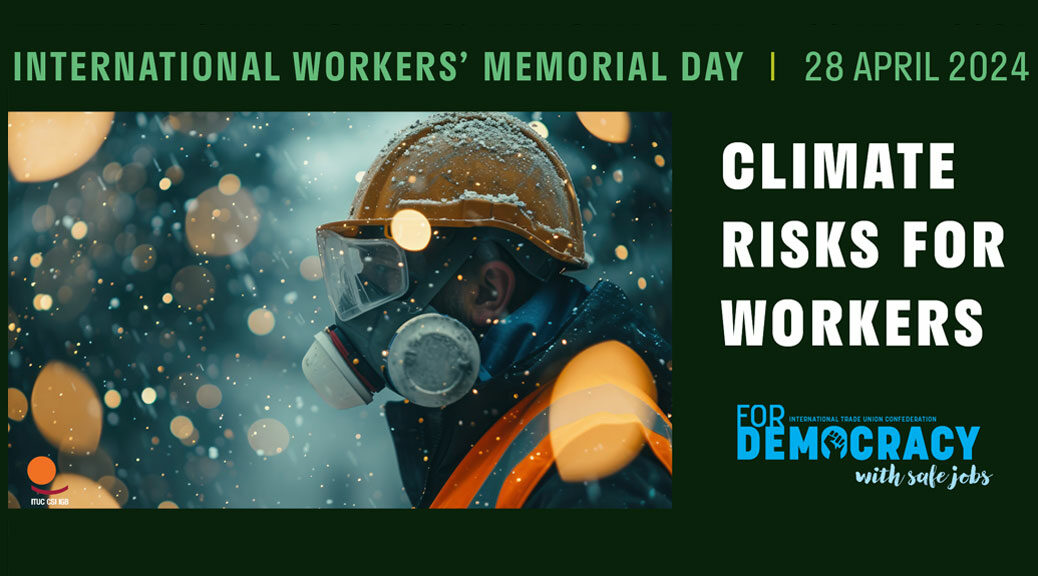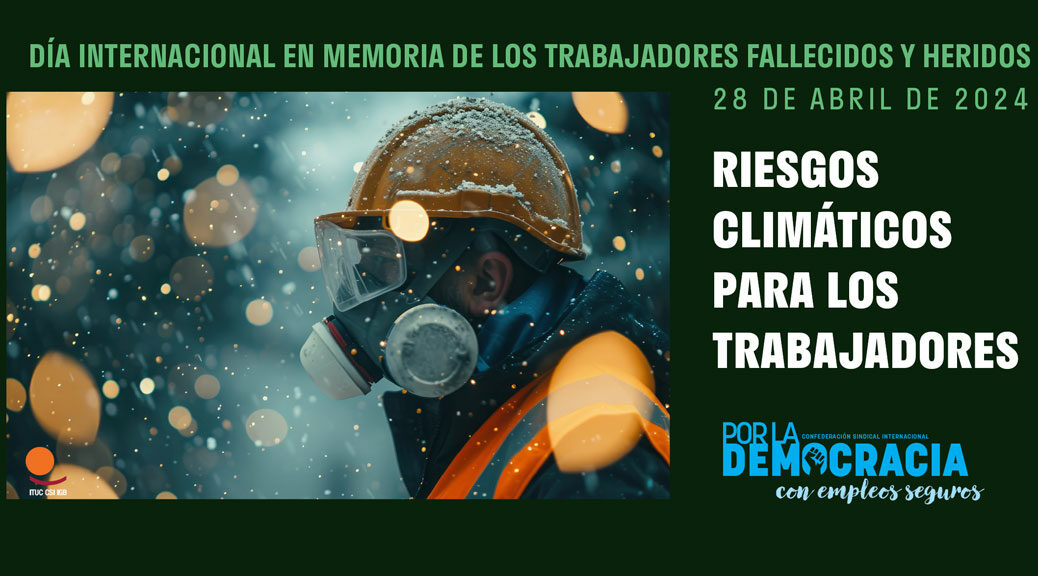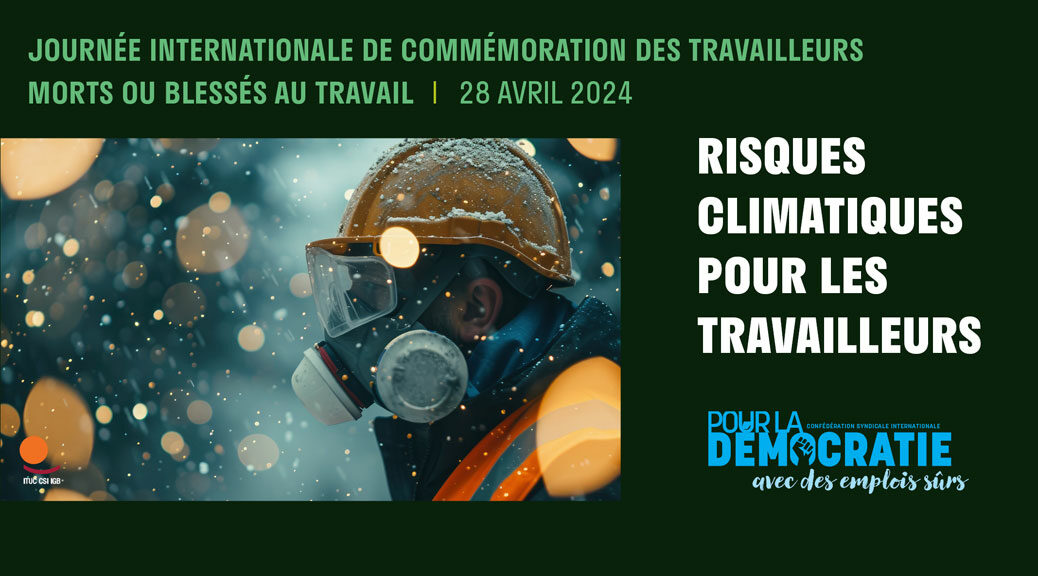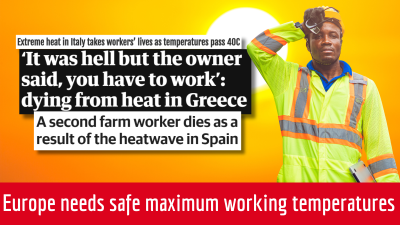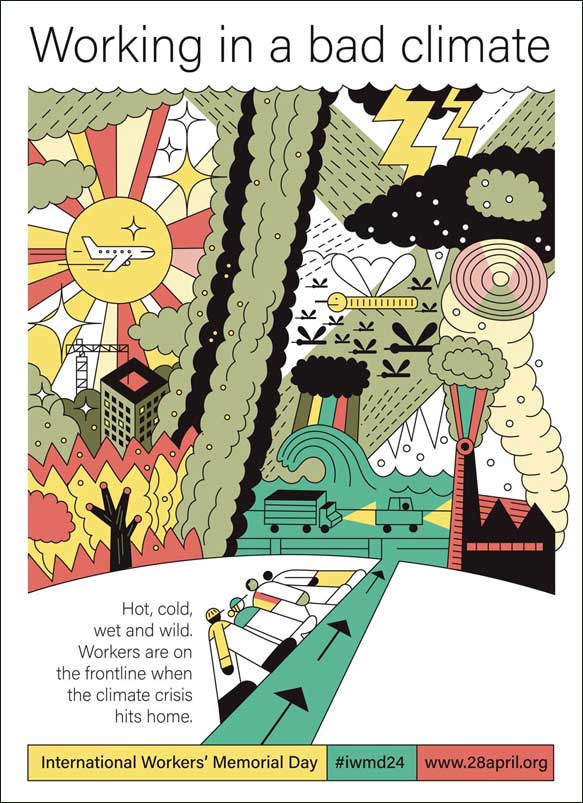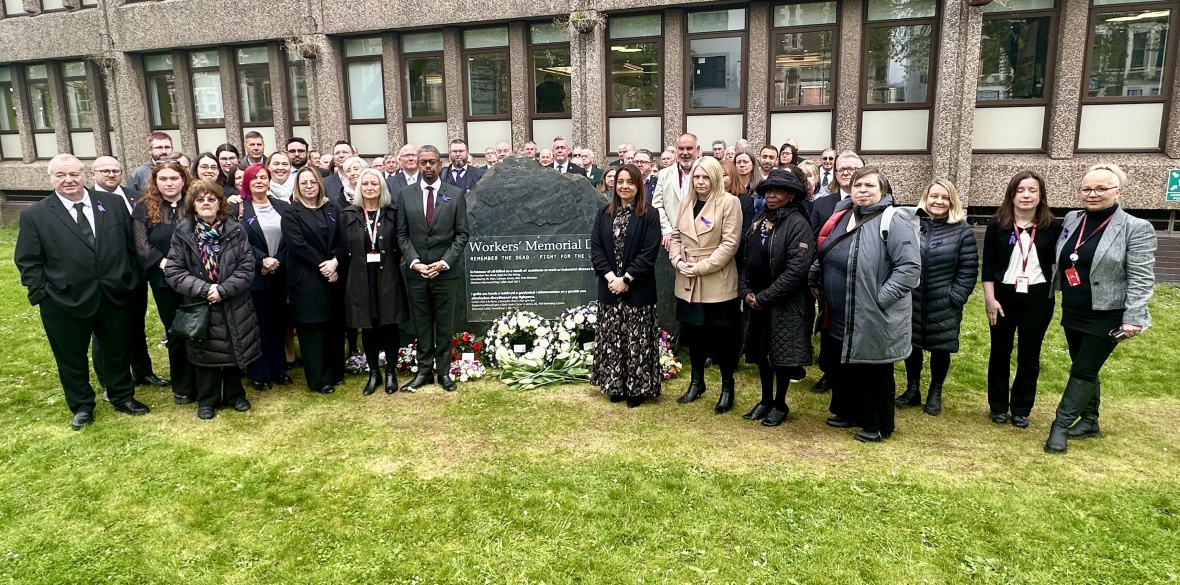
The Peoples Training & Research Center, Vadodara India has issued the following statement to mark 28 April.
Background:
Canadian Union of Public Employees (CUPE) organized a program to mourn workers who died in accidents at work on 28 April 1985. The idea was taken up by the groups working with workers on safety and health rights at work. Gradually the movement took wind. Now it is being observed in over 100 countries as International Workers Memorial Day. In 2003 ILO declared this day as World Day for safety health at work; after which industry celebrates it under this name though worker’s groups have continued to observe it as IWMD.
ILO declares safety and health at work as fundamental right
At its 110th Session in June 2022, the International Labor Conference decided to amend paragraph 2 of the ILO Declaration on Fundamental Principles and Rights at Work (1998) to include “a safe and healthy working environment” as a fundamental principle and right at work. The ILO Declaration on Fundamental Principles and Rights at Work, 1998, has been amended to this effect and the Occupational Safety and Health Convention, 1981 (No. 155) and the Promotional Framework for Occupational Safety and Health Convention, 2006 (No. 187) are now considered as fundamental Conventions. 76 ILO member countries have ratified C.155. Latest added to the list is Asian country Laos and Iran. India has refrained from ratifying this 1981 convention. As a first step to ratify the Convention, India declared its National Policy on Safety, Health and Environment at work in 2009 during UPA government but then second step of ratification is not taken yet. India is the only country among BRICS c countries not to ratify this convention and thus depriving workers in organized and unorganized sectors the right to be protected at work. The OSH code and other codes are now put on backtrack as a result of protest by the trade unions. In such a situation we do not see this Government to take any steps to ratify these conventions.
India’s contribution in deaths and injuries at work:
British Safety Council reported that 48,000 workers die in fatal accidents at work each year in India[i]. This is 20 times more than in Britain. WHO estimates 10 crore workers are injured globally in accidents at work and 1 lakh fatally.[ii] In India, 17 crore workers are injured in accidents at work which is 17% of the workers injured in the world. But in case of fatal accidents, India contributed 45%! 11 crore workers the world over are victims of different occupational diseases out of which 19 lakhs are from India. 7 lakh workers die the world over of occupational diseases in which 1.19 lakhs are Indians. These are estimates. It is difficult to get credible data on accidents at work. Despite browsing through different source like National Crime Bureau, Labor Bureau, DGFASLI, DGMS, ESIC, State labor departments, you may not get the full picture. In 2013, the rate of injuries was 0.37 per 1 lakh workers which rose to 0.49 in 2014. ESIC reported 2.41 crore workers injured in 2016-17 and 3.02 crore in 2017-18
ILO estimates daily 6400 workers die in fatal accidents at work and 8.60 lakh are injured. Annually 3.5 lakh workers die in accidents at work and more than 20 lakh die of different occupational diseases. 31.3 crore workers meet with injuries in accidents at work which prevent them from attending duty. Annually 16 crore workers get injured in occupational diseases. Thus it can be seen that occupational diseases kill 6 times more workers than those who die in accidents at work. Occupational cancers, kidney and liver diseases following exposure to chemicals, diseases caused due to exposure to heavy metals like Cadmium-Chromium-Lead-Mercury etc. kill workers which remain beneath the carpet
Occupational Diseases:
WHO/ILO published joint estimates of work-related burden of diseases and injuries in September 2021. The estimates are for the period 2000-2016 and not beyond. According to this report, globally in 2016, a total of 1.88 million deaths were estimated to be attributable to the 41 pairs of occupational risk factor and health outcome. Diseases accounted for 80.7% of the deaths and injuries accounted for 19.3% of the deaths. All covered diseases are non-communicable diseases. The occupational risk factor with the largest number of attributable deaths was exposure to long working hours followed by occupational particulate matter, gases and fumes (450,381 deaths) and occupational injuries (deaths). The health outcome with the largest work-related burden of deaths was chronic obstructive pulmonary disease (450,381 deaths), followed by stroke (398,-306 deaths) and ischemic heart disease (346,618 deaths).
ILO has estimated that 4% of GDP is lost due to accidents and work-related diseases. In 2001, 4% of world GDP came to more than the US$1,251,353 million.” Converting this figure in Indian rupees it comes to Rs. 96.35 lakh crore!!! In some countries, the loss goes up to 6%.
Mourn the dead, fight for living:
Public programs are organized on 28 April to draw the attention of the society in general and Government and industry in particular to the grave situation and present the demands. “Mourn for the dead and fight for the living” is a popular slogan. Victims and survivors are encouraged to join the programs while in some countries they are so empowered to organize their programs independently. In some countries, memorials are built at the site of accidents and victims and other citizens organize programs at such memorials. They present data on the numbers of workers who died in accidents or occupational diseases during the previous year. Pictures of the victims are offered flowers and candle lights. Activists demand to know who was responsible for the accident, to book the culprits, to pay compensation to the victims and actions to prevent a recurrence.
Where is National Policy?
In 2009 India declared a “National policy on Safety, Health and Environment at Work” but the new government forgot to take any actions in accordance with the policy. Four labor codes have been passed by the Parliament but there is no discussion on the National policy. When there are no data generated, the problem does not exist and when there is no problem how can we have budgetary allocation? Is it possible to have any program without a budget?
National TB Elimination Program:
India has ambitious program for elimination of TB by 2030. In 2022, 24.2 lakh TB patients were notified.
India TB Report 23 notes “Co morbidities like under nutrition, diabetes, HIV, tobacco smoking, and alcohol impact a person with TB in predisposition and severity.” The report forgets silica here. International Commission statement notes, “The International Commission on Occupational Health (ICOH) calls for a concerted global effort to promote Occupational Safety and Health strategies to prevent tuberculosis (TB) in high-risk occupations including silica dust exposed workers in mining, construction and other industries. The highest exposed are often the most vulnerable, disadvantaged, and medically underserved in countries with the highest burden of TB.” However, later in this report it notes, “The program also envisages implementing a shorter regimen for TPT in priority populations such as diabetics, people using tobacco, people having silicosis etc.” In 2022 Government launched TB Preventive therapy module. But it is not initiating National Silicosis elimination program offered by ILO/WHO yet. As long as workers continue to be exposed to silica at work, they will remain vulnerable to TB.
SDGs:
Under sustainable development goals (SDGs) by United Nations, SDG 3 is “Good health and well-being” while SDG. 8 is “Decent work and economic growth.” 2020 Country report on SDG performance by NITI Ayog[iii] notes: SDG India Index and Dashboard, for SDG 8 and its disaggregated seven national indicators, the overall Index Score for the country is 64. Approximately 80 per cent of India’s workers are employed in the unorganized sector and more than 90 per cent in informal employment. Such a huge workforce is not covered by the majority of labor laws. Therefore, these workers lack access to benefits like safety standards and minimum wage.” Then how are we going to achieve the goal by 2030?
Climate change:
Globe is getting hotter and hotter. Climate change is taking its toll. As per recent ILO report, billions of workers are exposed to hazards exacerbated by climate change. Every year, an estimated 22.85 million occupational injuries, 18,970 deaths are attributable to excessive heat alone. Strong evidence demonstrates that numerous health conditions in workers have been linked to climate change, including cancer, cardiovascular disease, respiratory illnesses, kidney dysfunction and mental health conditions, among many others. Thousands more die from pesticide poisoning (>300,000), workplace air pollution (>860,000), solar UV radiation (>18,960 due to non-melanoma skin cancer alone) and parasitic and vector-borne diseases.[iv]
In India workers agriculture workers, construction workers, vendors, factory workers who are working on the furnace or boilers in power plants, chemical factories, foundries, rolling mills, cements factories, transport workers – the drivers sitting near engine are exposed to elevated heat. But we do not have no data on the numbers of workers working in elevated temperature and we do not have any action plan to protect them.
A huge challenge is lying before the new Government at center pot general elections will to protect health and safety of the workers in organized as well as unorganized sectors
*Jagdish Patel, Director, Peoples Training & Research Centre, Vadodara
Contact – jagdish.jb@gmail.com
[i]https://www.britsafe.org/about-us/press-releases/2019/the-future-of-health-and-safety-in-india/
[ii]https://www.who.int/occupational_health/publications/declaration/en/
[iii]http://niti.gov.in/sites/default/files/2020-07/26281VNR_2020_India_Report.pdf
[iv] Ensuring safety and Health at work in changing climate https://webapps.ilo.org/wcmsp5/groups/public/@ed_protect/@protrav/@safework/documents/publication/wcms_922850.pdf
